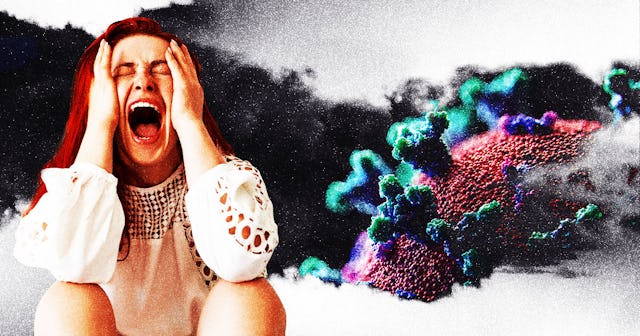Pandemic Dreams Are A Thing -- And We’re All Having Them

We’re all dealing with the COVID-19 pandemic in our own ways. We all have our own unique struggles, and all are valid (though reading the room is highly advised). But there are a few things that seem to be common to most of us during this shared trauma.
We all have a new appreciation for the intense dedication of healthcare workers.
We have a heightened awareness and gratitude for delivery drivers, grocery store workers, mass transit operators, and all who are risking their lives to keep the system running.
And we all seem to be having weird dreams.
Of all the ways we could be commonly affected by the pandemic, the first two points make sense. The healthcare workers are battling this virus daily and their sacrifice is reflected in the heartbreaking and heart-warming stories we see and read daily. And the essential workers who are showing up every day to do jobs that once upon a time were largely under-appreciated will be forever associated with not only the word essential but also words like brave and dedicated.
But the third?
At first, I thought the weird dreams were just me. As a writer, I pride myself on my overactive imagination and didn’t think much of the stories playing out in my sleep. But then my daughter admitted to having dreams that felt almost like nightmares. But kids have nightmares so her admission wasn’t so surprising. And then a friend mentioned her vivid dreams and another friend mentioned his strange dreams, and the New York Times reported that the Google query “why am i having weird dreams lately” had quadrupled.
And suddenly having weird dreams felt like an almost collective pandemic experience.
But why?
In an article for CNBC, Christina Pierpaoli Parker, a behavioral sleep researcher at the University of Alabama at Birmingham, wrote that “our colorful yet strange dreams may be a reflection of the negative emotions invited by Covid-19.”
Which makes sense. Negative emotions is a polite way of referencing the all-out raging anxiety that comes with living in an age where there’s no guarantee tomorrow will look anything like today. We’re afraid for the health of our parents and our kids, the permanence of our jobs and our society. We’re waking up grieving normal each morning and going to bed wondering how tomorrow will look. With all that happening in our heads each day, it’s easy to see why our dreams are affected.
There might also be an evolutionary explanation for our dreams related to that primal fight-or-flight reflex. Our fight-or-flight response is triggered when we’re presented with a threat. For most of us, the pandemic serves as one of the biggest invisible threats we’ve ever faced.
Eva Selhub, M.D., a physician and expert on stress and mind-body medicine, explained how the fight-or-flight response might affect dreams in an interview with mindbodygreen. She said, “From a very basic level, if you’re being chased by a lion, the last thing you want to do is sleep…. To the brain, uncertainty is no different from being chased by a lion; they are both threats.”
When our fight or flight response kicks in, the release of stress hormones keeps us from falling into a deep sleep to help us remain vigilant to the threat. Meaning we spend more time in that light sleep cycle where dreams happen.
Add in the disruption to our normal schedule and late nights consuming all—literally all—the news, it’s not so surprising that we’re all dreaming in strange, vivid bursts.
Many unknowns still exist when it comes to what we know about the science of dreaming. But if the vivid dreams are leaving you more exhausted than when you went to bed, Selhub offers a few tips for getting a better night’s sleep.
She suggests consuming news less often—or at least limiting news consumption to mornings and afternoons—following a set sleep schedule, picking up a meditation practice, engaging in mindfulness, connecting with others, and finding a way to do a little good—like supporting a charity—which could temper some of that helplessness that many of us not on the front lines are dealing with.
After my daughter’s second night of nightmares, I told her to try and think about something else before she fell asleep. I doubted the effectiveness of the advice (because when someone tells you not to think about the pink elephant, you’re going to think about the pink elephant), but I had nothing else to offer.
As it turns out, that advice wasn’t way off. Deirdre Barrett, a psychologist at Harvard Medical School who has spent decades studying dreams, told the New York Times that it was possible to “program” your dreams by choosing the category of dream you’d like and visualizing it before bed. The technique doesn’t have a hundred percent success rate—for my daughter, it works about half the time—but it’s worth trying if your dreams are disturbing you.
And if none of these tips and tricks work, then maybe there’s some comfort in knowing that maybe those vivid dreams are doing some good. According to Dr. Barrett, “There’s some theory that simply activating the brain every 90 minutes may be good for it in some way.”
Vivid dreams and strange dreams and nightmares may be here to stay for the length of the pandemic. While the world remains paused, while uncertainty is written between the lines of every new development, maybe there’s some comfort to be found in the fact that other people are having weird dreams, too.
In knowing that our singular experience is universal. In being reminded that we’re truly all in this together.
This article was originally published on